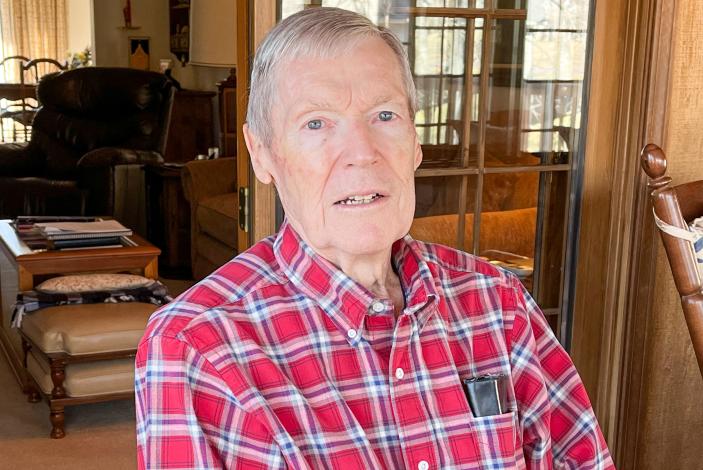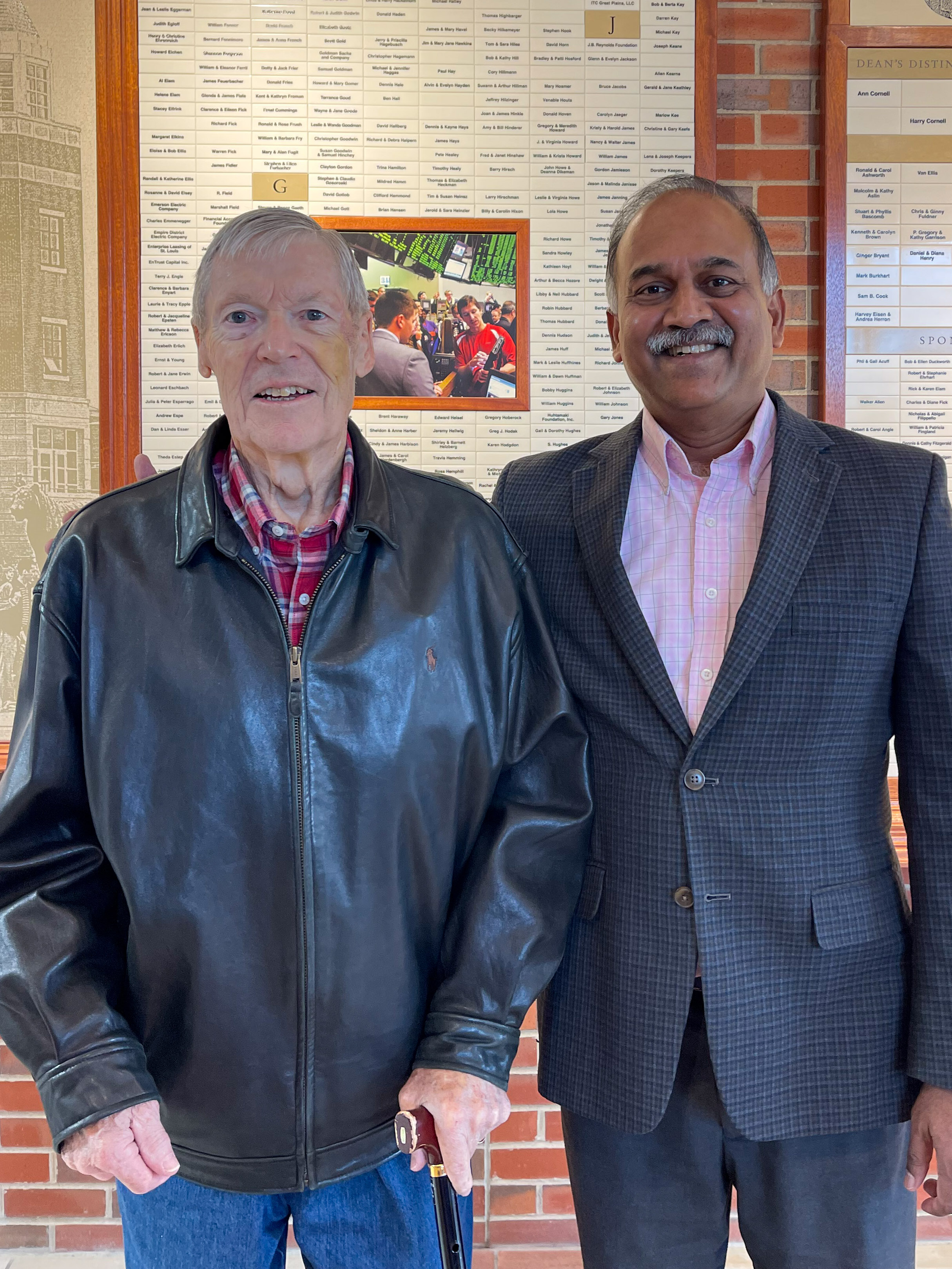
With a heart for accounting and students, retired director of the School of Accountancy continues to give back

Ray Dockweiler, retired director of the School of Accountancy, has long supported the Trulaske College of Business and the accounting profession to which he dedicated his 32-year career.
Ray Dockweiler is a person of conviction.
He dedicated his entire 32-year career to the School of Accountancy at the Trulaske College of Business. Though he retired in 2000 – a tenure that included a 10-year stint as director of the School of Accountancy and the launch of the school’s 150-hour program – his unwavering commitment to the college, students and profession continues to this day through annual contributions to support the college and a School of Accountancy scholarship fund in his name.
“Accountancy is the language of business in many respects,” Dockweiler said. “You can’t have a successful business without accounting being a part of it. In fact, in many big businesses, the CPA is a major player in directing what goes on. To me, accountancy is a pretty important area of business, and I’m proud to have been a part of it.”
Vairam Arunachalam, director of the School of Accountancy and PricewaterhouseCoopers/Joseph A. Silvoso Distinguished Professor of Accountancy, was hired by Dockweiler in 1991, and quickly learned to appreciate Dockweiler’s leadership style.
“What I learned from him was the value of interpersonal relationships and persistence – speaking softly but having great impact,” Arunachalam said. “His approach, from the very start, affirmed my own values of being kind, generous and personable with everyone. That’s what Dr. Dockweiler embodied as a leader – and he was the main reason that I chose to come to Mizzou 33 years ago.”

A foundation of family
Dockweiler grew up in Lansing, Illinois, a suburb south of Chicago, whose population numbered about 10,000 in those early years of the 1940s. He and his younger brother Tom, who still lives in the area, joined a large family of uncles, aunts and cousins, who became an integral part of the brothers’ lives.
In fact, Dockweiler’s first job, a paper route at the age of 12, came under the tutelage of his Uncle George, who ran the local news agency. It was Dockweiler’s first dip into the business world, where he soon recognized the power of personal service.
“We had four newspapers in those days,” he recalled. “I delivered two papers in the morning, two papers in the afternoon and then I had to collect money from subscribers.”
Dockweiler also learned, while pedaling across town delivering papers, that his dad, an insurance salesman and local school board member, was as loved and admired by his community as he was by his son – a realization that had a profound impact on Dockweiler.
“My dad was as friendly as could be,” he said. “It seemed like everyone in town knew my dad.”
Education, love and a home at Trulaske
By high school, Dockweiler had turned his focus to school and sports. He played football, basketball and baseball. He also enjoyed singing and was a member of a choral group called the Meistersingers. When it came time for college, Dockweiler chose Miami of Ohio in Cincinnati and majored in business education. It was here that he discovered a passion for accounting and squeezed every accounting course he could into his schedule.
Now on the path of accountancy, Dockweiler enrolled at the discipline’s leading school in the country: University of Illinois at Urbana-Champaign, where he received a master’s degree and a doctorate in accounting. He also married his wife Eleanor – who goes by Ele – in Champaign, during his first year of graduate school.
Although they grew up only six blocks apart and attended the same high school, the couple didn’t begin dating until the summer before their first year of college. Ele, who majored in business, attended Michigan State University. Dockweiler often hitchhiked to his future bride’s campus during the early years of their romance.
“It was the 1960s, and everyone hitchhiked in those days,” he said with a chuckle.
Shortly before graduating, Dockweiler began looking for a job, eventually whittling down his choices to Arizona State University or the University of Missouri. The couple visited both campuses, and the choice was clear: the home of the Tigers.
“We were both used to greenery, and Arizona seemed so dry and devastating, especially to Ele,” Dockweiler recalled. “It was a good school, but it just didn’t feel right for us. It wasn’t home.”
Plus, MU’s College of Business had Joseph Silvoso, widely regarded as the leader of the Schools of Accountancy movement, who would later help establish the college’s School of Accountancy in 1975. Dockweiler joined the faculty as an assistant professor of accountancy in the spring of 1968. He eventually earned tenure and became director of the School of Accountancy in 1986.
The Dockweilers raised two sons – one who graduated from Trulaske in 1989 – and today, enjoy six grandchildren, one of whom is attending Mizzou.
Reflections on a career of service
Dockweiler saw many changes at the Trulaske College of Business during his decades-long career, including the increasing importance of computers in accounting practice and the development of the college’s 150-hour accounting program.
“There were other factors as well that affected accountancy, including the growing importance of governmental and managerial aspects of accounting,” he said.
Dockweiler’s proudest accomplishment was being named director of one of the nation's best accountancy programs. According to the most recent Public Accounting Report Annual Professors Survey, the School of Accountancy is ranked 13th for its undergraduate program, 11th for the master’s degree program and 17th for the doctoral program.
“We placed graduates all over the nation,” he said, adding a close second was helping to develop the 150-hour program.
Arunachalam said Dockweiler’s contributions strengthened the options for students by providing them with the opportunity to receive a bachelor’s and master’s degrees in an integrated 150-hour program from a highly regarded School of Accountancy.
Through it all, however, Dockweiler remained an educator at heart, always looking out for the best interest of his students.
“Teaching accounting was special to me because I was preparing students to develop future careers in an important profession that would make it possible for them to make a good living for themselves and their families,” he said. “I think the secret to being an effective accounting professor is to be someone who really cares about his/her students and is well prepared each day for class.”
Arunachalam said Dockweiler also made a point of lifting up his fellow faculty members.
“He would send me emails or handwritten notes, encouraging me and affirming what I was doing,” he said. “He wanted me to succeed, and it was nice to receive that affirmation. In Dr. Dockweiler’s case, whether advice or admiration, it was always unsolicited, and there is value in that because I knew that it always came from his heart.”